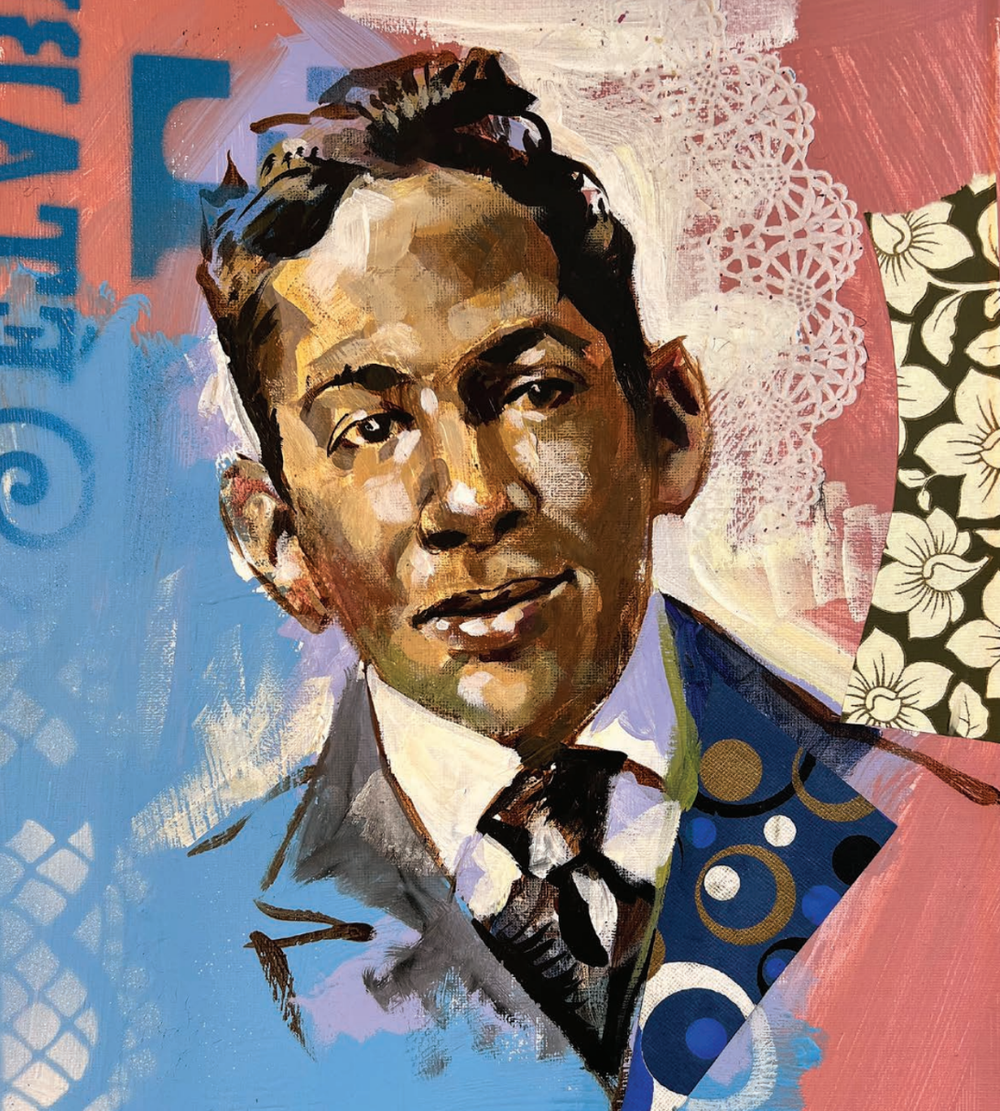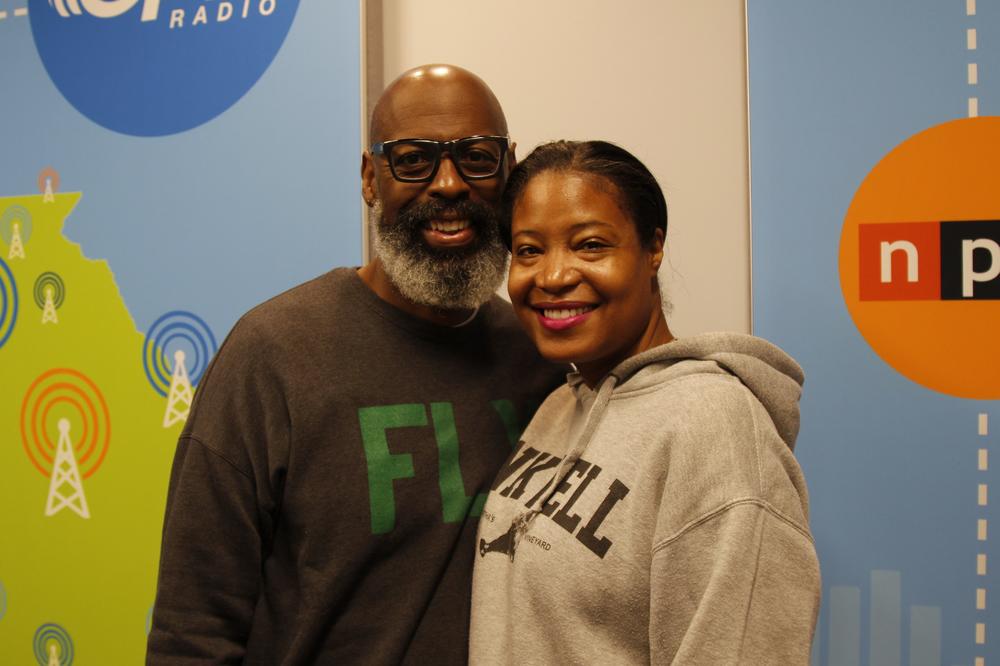
Caption
"Young Langston" by Charly Palmer appears as one of many pieces of original art in "The New Brownies' Book."
Credit: Courtesy
LISTEN: "The New Brownies' Book" is inspired by the original periodical published by W.E.B. Du Bois in the 1920s and and keeps the same mission in mind: to ensure Black children know they are loved. GPB's Peter Biello speaks with the editors of today's version.

"Young Langston" by Charly Palmer appears as one of many pieces of original art in "The New Brownies' Book."
In the 1920s, a bimonthly periodical co-founded by W.E.B. Du Bois aimed to lift up Black children and demonstrate to them that they are loved. It featured work by some of the best Black creatives of the era, including the poet Langston Hughes. It was called "The Brownies' Book: a Monthly Magazine for Children of the Sun." An Atlanta couple recently published an homage to W.E.B. Du Bois' periodical: The New Brownies' Book is inspired by the original and keeps the same mission in mind. Editors Dr. Karida L. Brown and Charly Palmer spoke with GPB's Peter Biello about their book.
Peter Biello: So tell me about what inspired you to reintroduce this concept to a new generation.
Karida L. Brown This book was a part of our love story in many ways. Charly and I, we were dating back in like, 2017, and that was the same time that I was doing research for an academic book on W.E.B. Du Bois's sociological work. So this was a book about his scholarship. I was knee deep in Du Bois's archives and discovered these letters that he was sending to all of these literati of the Harlem Renaissance, pretty much begging for a piece of their best work to contribute to this new magazine that he was starting for Black children called The Brownies' Book. I had been working on Du Bois for almost a decade at that point and had never heard of this. So I discovered The Brownies' Book during this time where Charly and I were just starting to get to know each other, and I was just so moved by the book, I shared it with him. And I — there's an email that we sent where I said "We should do this."
Charly Palmer: So about four years later is when, during the pandemic, we were sitting around not necessarily bored, but having a conversation and watching what was going on with the protests, with the assassination of certain Black bodies. And we responded by saying, "Listen, there's a lot of people that are pent into houses or their homes." And we looked at our Rolodexes and realized that we both knew a lot of accomplished people. And so we started thinking, "you think they would say yes?" And so we composed the letter and then — or got on the phone — and said, "We have this idea. We would like for you to be a part of it." And everyone resoundingly said, "Absolutely, yes, I'm in."
Peter Biello: And when you reached out to folks, what were you asking them for specifically? Because the contents of this book — there's a wide range, right? There are stories that address aspects of the Black experience that are painful. The interaction with police; "The Talk" — having to have The Talk with children, for example. But there's also really sweet and fun pieces, like the piece about the Halloween costume. I don't want to give it away; folks need to read the book — Or, or the piece about lactose intolerance. So what were you asking for? And then when you received the pieces, how did you strike the balance?
Charly Palmer: We just asked them, Give us your expression of love to the Black family.
Peter Biello: This book is divided into a variety of sections. There's a section, for example, on historically Black colleges and universities. There's a section on Black women heroes. Is there a section — and this question's for both of you — that you are particularly excited to share with the world?

Charly Palmer and Dr. Karida L. Brown at GPB's studios on Oct. 19, 2023.
Karida L. Brown Mm. I will say that section on — it's called "She-roes," and it is about Black women of note that we should all know. I love that chapter. And I must admit it was not our idea. That idea came from an intern from Spelman University, Chase Malone, who was a freshman in college at the time. She curated that list of 26 Black women, and then Charly created pen and ink illustrations for each one.
Charly Palmer: One of my favorite sessions; it has recipes.
Karida L. Brown "Let me count the ways."
Charly Palmer: "Let me count the ways." And what it was we were originally going to create a section on soul food. Actually spoke to some friends of ours who have some more health — healthy solutions. And so that's where I reached out to my sister said, "Send me mom's recipes." But what I love about it more than anything is that my mom's in it. But I was noticing one day when I'm looking at the handwriting that this is not all my mom's handwriting, and my brother was the one who said, "Hey, those are not just mom's. Those are also our grandmother's." So I'm just really excited to see that my grandmother and my mother are a part of this book.
Peter Biello: You decided to republish some of Langston Hughes' work. Why did you decide to do that?
Karida L. Brown I wanted young people who are experiencing The Brownies' Book to see that we all get a start somewhere. And those are Langston's early works. They're not super developed, and some of the poems aren't even that good. But the point is, you know, he got his start somewhere and he put it out there and he kept trying at his craft and look at what he grew into. So there's a lesson there as well.
Peter Biello: This book hasn't been out for very long, but I'm wondering if you've received any feedback on it yet that has been particularly meaningful for you?
Karida L. Brown We recently gave a book talk in D.C. and one of the attendees pulled me to the side after the talk was over and said, "I'm 73 years old and I'm just learning to fully express myself." She grew up in an era of "children are to be seen, not heard," and she was emotional because she said she's been every night spending a little time with her Brownies' Book as a 73-year-old. That meant so much to me because it's a reminder that no matter how many years we tack on, we were all once children. And it was a reminder to me that this book is for everybody.
Charly Palmer: Greatest feedback is people responding like: "More, give us more," you know? And we hadn't thought about it because this was a wonderful journey to create, but we never thought about expanding on it. But we talk about the original publication as a call and response. And so there are a lot of people that are going to react and want some kind of feedback. And so we're looking forward to finding ways to engage in that way.
Peter Biello: You just mentioned call and response, right? And when people are wanting to respond to this, is this a one-off or will there be Volume 2?
Karida L. Brown We keep getting asked that question by folks who buy the book that say: "What's next" or we meet artists who say, "This is wonderful, I'm going to be in the next one." And so I think it's already out there in the universe that but that remains to be seen.
Charly Palmer: And I don't think that we're necessarily attached to the idea that we pass the baton. You know, it's like this was our child and everybody who has two children know that the second child may not be anything like the first one. And so it's like, we never thought about a second child. We're producing this book. We want this out there. And the response may be someone completely different, but we are here to honor Du Bois, and that's what our intent is, and to stay true to his original mission. Even the way we approached it was how he approached it.
Peter Biello: Well, please forgive me for asking about your second book when you're trying to celebrate this one.
Karida L. Brown Giving us more work!
Peter Biello: Well, we appreciate the work you've done here. Dr. Karida L. Brown and Charly Palmer are the editors of The New Brownies' Book: A Love Letter to Black Families, and they're scheduled to appear Tuesday, Oct. 24 at the Auburn Avenue Research Library in Atlanta at 7 p.m. in a conversation moderated by Ida Harris of Black Enterprise Magazine.